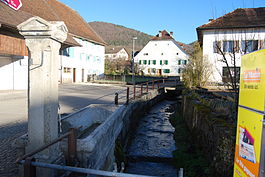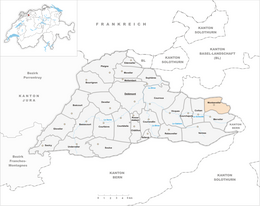Montsevelier
| Montsevelier | ||
|---|---|---|
| Former municipality of Switzerland | ||

Montsevelier river in Montsevelier village
|
||
|
||
| Coordinates: 47°21′N 07°30′E / 47.350°N 7.500°ECoordinates: 47°21′N 07°30′E / 47.350°N 7.500°E | ||
| Country | Switzerland | |
| Canton | Jura | |
| District | Delémont | |
| Area | ||
| • Total | 7.75 km2 (2.99 sq mi) | |
| Elevation | 565 m (1,854 ft) | |
| Population (2011) | ||
| • Total | 508 | |
| • Density | 66/km2 (170/sq mi) | |
| Postal code | 2828 | |
| SFOS number | 6717 | |
| Surrounded by | Mervelier, Corban, Bärschwil(SO), Grindel(SO), Erschwil(SO), Beinwil(SO) | |
| Website |
www SFSO statistics |
|
Montsevelier is a former municipality in the district of Delémont in the canton of Jura in Switzerland. The municipalities of Montsevelier, Vermes and Vicques merged on 1 January 2013 into the new municipality of Val Terbi.
Montsevelier is first mentioned in 1136 as Muzivilir. The municipality was formerly known by its German name Mutzwil, however, that name is no longer used.
Montsevelier had an area of 7.79 km2 (3.01 sq mi). Of this area, 3.91 km2 (1.51 sq mi) or 50.2% is used for agricultural purposes, while 3.57 km2 (1.38 sq mi) or 45.8% is forested. Of the rest of the land, 0.32 km2 (0.12 sq mi) or 4.1% is settled (buildings or roads), 0.01 km2 (2.5 acres) or 0.1% is either rivers or lakes.
Of the built up area, housing and buildings made up 2.4% and transportation infrastructure made up 0.9%. Out of the forested land, 43.1% of the total land area is heavily forested and 2.7% is covered with orchards or small clusters of trees. Of the agricultural land, 17.5% is used for growing crops and 20.5% is pastures, while 1.5% is used for orchards or vine crops and 10.7% is used for alpine pastures. All the water in the municipality is flowing water.
The former municipality is located in the Delemont district, in the upper most section of the Val Terbi.
The blazon of the municipal coat of arms is Argent, a Vol Gules
Montsevelier has a population (as of 2011[update]) of 508. As of 2008[update], 1.8% of the population are resident foreign nationals. Over the last 10 years (2000–2010) the population has changed at a rate of -4.9%. Migration accounted for -6.4%, while births and deaths accounted for -0.2%.
Most of the population (as of 2000[update]) speaks French (484 or 96.2%) as their first language, German is the second most common (16 or 3.2%) and English is the third (1 or 0.2%).
...
Wikipedia



